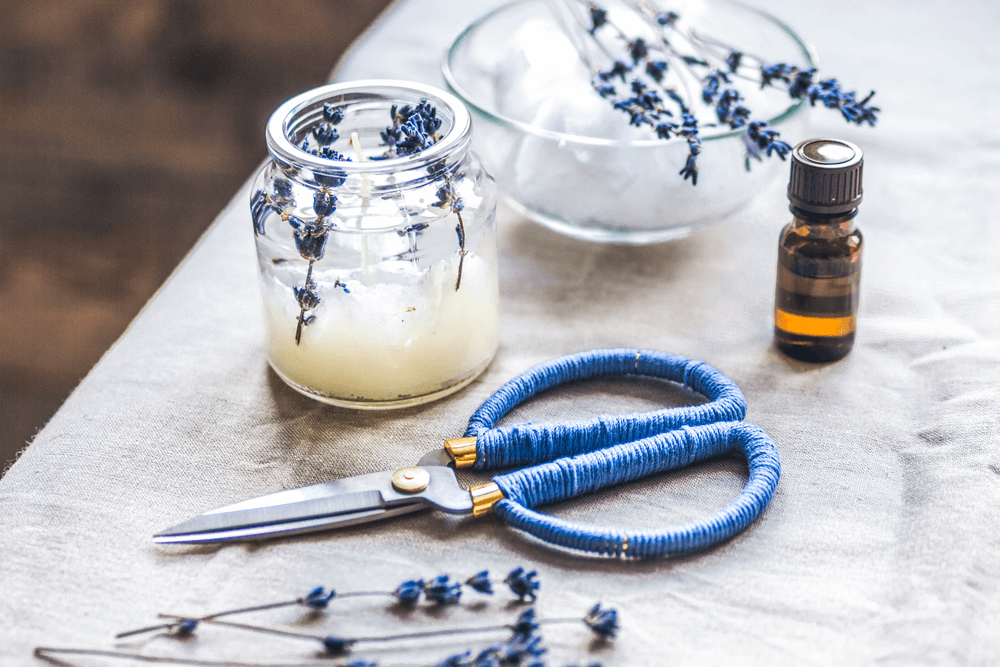
If you’d like to try your hand at candle making, set aside two hours one day next weekend, and start with an easy project, using your old candles to test the waters. If it’s instant gratification you crave, you’ll see the fruits of your labor in just a couple of hours with a minimum expenditure for supplies.
People often speak of candle making and soap making in the same sentence as if they are similar experiences. The process is not the same. If you have thought of making your own soap, try candle making first. The process may appear similar, but it’s simpler and safer.
When you make your own candles, you are simply melting wax, not conducting chemical experiments in your kitchen.
We’ll give you a play-by-play preview of the process, but consider this an overview. Before you actually set up shop and play candle maker for the afternoon, download a proper set of step-by-step procedures from the Internet.
You’ll find hundreds of candle-making projects available online, but start by recycling your old candles just to get a feel for the process. In fact, in this overview, we’ll describe the process of melting down your old candles and turning them into brand new votive candles.
If you enjoy the experience, which is similar to cooking, then you’ll want to order more supplies before beginning your candle-making hobby in earnest. With a little practice, you can give unique, hand-made holiday gifts, and delight your friends with something that you personally created.
Safety First
Anytime you work around an open flame, you have all the ingredients for a potentially dangerous situation. Work carefully and mind your safety P’s and Q’s at all times. Candle making requires your undivided attention. Don’t even think about multitasking while working with hot wax.
Materials and Preparation
Before you begin, you’ll need to gather the following equipment:
Old candles – anything that you would otherwise throw away
Votive wicks, pre-tabbed
Votive molds (metal is best)
Scissors
Silicone spray for metal votive molds
Old saucepans to create a “double boiler”
Candy thermometer
Oven mitts
To minimize cleanup, cover your burners with aluminum foil and spread old rags or newspapers over a flat work area.
Prepare the Molds
If you prepare your molds in advance, you won’t have to scramble at the last minute, and risk the possibility of your wax cooling before you can pour it.
Spray the inside of each mold with Silicone per the instructions on the can.
Place a pre-tabbed votive wick in the mold, and set aside.
Melt the Wax
This process requires your undivided attention.
Remove old wicks, labels, etc. At a bare minimum, clip the burnt part of the wick.
Melt the wax.
If you’re using old jar candles, you’ll need to melt the wax in the jars separately.
Pour the Molds
Allow the melted wax to cool to 160 to 180 degrees F.
Pour the wax into the prepared molds.
Allow to cool and shrink.
Melt wax for the repour and allow it to cool to 180 degrees F.
Repour to top off the molds.
Allow to cool.
Remove the candle from the votive holder.
The key to successful candle making is preparation and setup. If you have everything prepared and within easy reach, you’ll have a smooth melt to pour process. If you haven’t prepared in advance, the wax may cool faster than you can prepare your work area and molds, costing you additional time.
That’s all there is to creating brand new candles from your candle remnants. If you enjoy the process, you can progress to creating your own custom candles from scratch, giving them as gifts, or even starting a brand new career path.

Welcome to my candle making blog! In this blog, I will be sharing my tips and tricks for making candles. I will also be sharing some of my favorite recipes.
